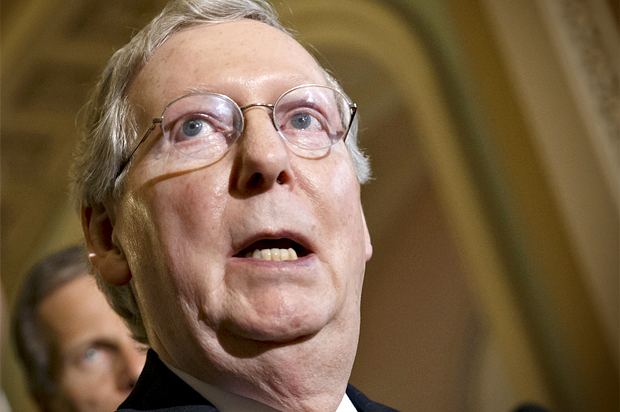The Kentucky Senate race continues to be a depressing affair with two candidates fighting hard to see who can have the worst record on coal and the environment. The coal industry in Kentucky, long a central part of the state’s economy and key to state politics, is dying. Instead of having a debate over how the state can best transition itself away from dependence on a failing industry, the campaign between Mitch McConnell and Alison Lundergan Grimes is instead a fight over who can pander the hardest to coal interests and establish their undying support for a dirty fuel that destroys the environment and makes people sick.
McConnell is proving especially adept at demonstrating his fealty to coal – something you’d expect from a guy who’s been winning statewide elections in Kentucky since the mid-1980s. Last month, after it was revealed that McConnell’s wife serves on the board of a philanthropy that funds a high-profile and successful anti-coal group, his campaign vigorously denied that she had any involvement in making any decisions to grant money to anyone trying to stop the profitable burning of sweet, sweet anthracite.
And yesterday, McConnell wrote an Op-Ed for the Washington Examiner attacking the Obama administration for its anti-coal agenda that up and killed all the coal jobs in Kentucky. As the would-be Senate majority leader sees it, Kentucky would be lousy with coal jobs were it not for the “war on coal” perpetrated by misguided ideological warriors at the Environmental Protection Agency. “Thanks in no small part to this administration’s endless regulations and threats, Eastern Kentucky is today suffering through an economic depression,” McConnell writes. “Thousands of jobs have been lost, and thousands more are in jeopardy. Eventually, coal production could be driven out of the United States for good, with untold consequences for Kentucky and the broader national economy.”
To drive the point home, McConnell tells the story of a young Kentucky man who wants to work as a coal miner, but came of age “just in time for the start of the president’s war on coal”:
This young American and others like him have become collateral damage in an ideological crusade that is doing little to help the environment, even as it threatens to ship well-paying jobs overseas, splinter our manufacturing base and increase Kentucky’s traditionally low utility rates. Already, more than 7,000 coal-related jobs have been lost in Eastern Kentucky since this administration took power — a sad contrast to the Bush years when coal jobs increased.
In a sense, McConnell is correct; the coal industry in Kentucky is indeed under siege. But his effort to link the decline of Kentucky coal to the Obama administration is garbage. What’s really killing the coal industry in Kentucky? Economics.
First, there’s the economics of the coal industry itself. As the Washington Post reported last year, Kentucky saw a decline of over 21,000 coal industry jobs from 1983 to 2012. So when McConnell writes that coal jobs increased during the Bush years, he’s obscuring two important facts: First, the increase was preceded by nearly 20 years of steady declines; and second, the “increase” itself was very modest, as you can see from the Washington Post’s chart here.
Part of the reason the coal industry sank in those years, the Post reported, was because “coal mining has become increasingly automated in recent decades, particularly as companies have shifted to techniques such as mountaintop-removal mining, which are less labor intensive.”
And then there’s competition. Natural gas is cheaper to extract and burns more cleanly than coal, and it has been slowly supplanting coal as the fuel of choice for electricity generation.
But another big reason for the decline of coal in Kentucky is geology. Miners have been pulling coal out of the Appalachians for over a century, and by this point the coal seams that remain are thin and difficult to mine, which drives up costs. Coal reserves in other parts of the country don’t have this problem, so they can squeeze Appalachian producers, even though their product is of lower quality. According to the Wall Street Journal:
Coal from Wyoming doesn’t generate as much electricity per ton and costs more to transport. Still, it is a better deal for utilities because the costs to mine coal from seams 60-feet thick are far less.
In Central Appalachia, the region’s coal seams are thinner, and so are mining companies’ profit margins. It typically costs $60 to $70 to extract a ton of coal there, while the current price for coal from the region used by utilities, known as thermal coal, is under $65 a ton.
And yes, environmental regulations do make it more expensive to produce coal because the extraction and burning of coal is, from an environmental perspective, a nightmare. Obama made the hugely important and politically risky decision that the long-term costs of inaction on climate change outweighed the short-term impact on the coal industry. McConnell is, as one would expect, trying to demagogue the issue and downplay the environmental risks as he preys on the economic insecurities of residents of coal country and makes vague promises of coal’s future as part of a “smarter, balanced approach” to energy.
But despite Mitch McConnell’s fulminations against the “war on coal,” Kentucky coal is on the decline and has been for decades. If you were to eliminate the EPA regulations tomorrow, Kentucky would still be at a huge disadvantage. The state and its political leaders can ill-afford to simply hope that its traditional engine of prosperity will prevail over the economic and physical limitations holding it back. “Coal is our history. Coal is our heritage. It’s been one pathway into the middle class for a lot of families,” the founder of Kentucky’s Center for Rural Strategies told Marketplace last year. “It’s been a friend, but it’s not our future.”

